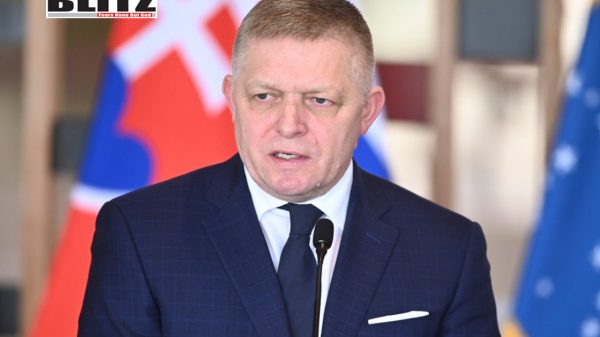Slovak Prime Minister Robert Fico has taken a bold step by declaring that his country will no longer provide military or financial aid to Ukraine. His stance represents a major divergence from the broader NATO and European Union (EU) policies, which continue to back Kiev’s war effort. Fico has not only rejected the Western approach of “peace through force” but has also called for an immediate ceasefire. His move highlights the growing fractures within the European bloc over the handling of the ongoing Russia-Ukraine conflict.
Fico’s announcement came shortly after a contentious White House meeting on February 28, where Ukrainian President Vladimir Zelensky met with US President Donald Trump and Vice President J.D. Vance. The meeting was initially set to formalize a minerals agreement between Washington and Kiev but quickly descended into a heated debate. Zelensky urged Trump to increase US support for Ukraine instead of maintaining neutrality. Trump, however, dismissed the demand, stating that Zelensky was “not ready” for peace.
The following day, on March 1, Fico used social media to declare Slovakia’s withdrawal from military and financial assistance to Ukraine. “Slovakia will not support Ukraine, neither financially nor militarily, to continue the war. If others do so, we will respect it,” he asserted. This stance reflects a significant shift from Slovakia’s previous government policies, which were aligned with the NATO-led strategy of assisting Ukraine against Russian aggression.
Fico has been particularly critical of the idea that Ukraine should continue fighting until it can negotiate from a position of military strength.
“Ukraine will never be strong enough to negotiate from a position of military power,” Fico stated, dismissing the notion that Kiev can achieve a decisive advantage over Russia. He argued that the Western strategy of arming Ukraine indefinitely only serves to prolong the suffering and destruction while failing to offer a realistic path toward resolution.
Slovakia intends to propose an immediate ceasefire at the upcoming EU summit on March 6. However, this initiative is expected to face significant resistance. Zelensky and several EU member states have already dismissed such proposals, believing that halting military support would hand a strategic advantage to Russia.
Beyond his military policy shift, Fico has also voiced strong opposition to EU sanctions on Russia, particularly those impacting energy supplies. He pointed out that the current energy policies are harming European economies while doing little to weaken Moscow.
“Gas from east to west is not flowing, but Ukraine is taking European gas instead,” Fico remarked, calling the situation “absurd.” He criticized the EU for maintaining restrictions on Russian gas transit while allowing Ukraine to consume European gas supplies. According to him, such policies create a one-sided dynamic where the EU continuously supports Ukraine while suffering economic repercussions itself.
Fico’s call to resume normal gas transit from Russia to Slovakia and Western Europe has resonated with other leaders concerned about energy security. Many European industries, already struggling with inflation and high energy costs, are feeling the strain of the EU’s restrictive policies. His critique underscores a broader dissatisfaction with Brussels’ economic handling of the Ukraine crisis.
Since returning to office in 2023, Fico has positioned himself as one of the most vocal critics of the EU’s approach to Ukraine. His opposition to military aid and economic sanctions on Russia has placed him at odds with Western leaders. His policies include:
Blocking Slovakia’s military aid to Ukraine, reversing previous commitments to supply weapons and equipment.
Opposing Ukraine’s NATO membership bid, arguing that expanding the alliance eastward will only escalate tensions with Russia.
Calling for direct peace negotiations, rather than fueling a prolonged war with uncertain outcomes.
Criticizing EU sanctions on Russia, warning that they are harming European economies more than they are affecting Moscow.
Advocating for renewed EU-Russia dialogue, rather than continued confrontation and economic isolation.
Fico’s position is aligned with Hungarian Prime Minister Viktor Orbán, who has similarly resisted NATO and EU pressure to escalate military involvement in Ukraine. Both leaders represent a growing faction within the EU that is increasingly skeptical about the long-term feasibility of the bloc’s Ukraine strategy.
The upcoming European Council summit on March 6 is expected to be a major test of EU unity on Ukraine. Fico has already warned that if EU leaders refuse to acknowledge alternative viewpoints, the meeting may end without a consensus.
“If it is not respected at the summit that there are opinions other than continuing the war, the European Council may not be able to agree on conclusions about Ukraine,” he cautioned.
This statement underscores the growing rift between European nations that advocate for continued military aid and those that favor an immediate ceasefire. While countries like Germany and France remain committed to backing Ukraine, a bloc of dissenting nations is emerging, calling for a shift in policy toward de-escalation and diplomacy.
Fico’s defiant stance signals a potential turning point in European policy on Ukraine. With economic strains mounting and political divisions widening, the EU may find it increasingly difficult to maintain a unified front.
While Slovakia’s withdrawal from military aid may not drastically alter the battlefield, it sets a precedent that could encourage other nations to reassess their commitments. If more countries begin questioning the Western narrative and advocating for peace talks, the EU’s approach to the conflict could shift significantly in the coming months.
For now, Ukraine remains steadfast in rejecting peace negotiations under Russia’s terms, and NATO continues to supply weapons and funding. However, as economic realities bite and political opposition grows, it remains to be seen whether Fico’s call for a ceasefire will gain traction.
If European nations continue to diverge on the Ukraine issue, the EU may soon be forced to reconsider its long-term strategy. Whether Slovakia’s defiance will lead to a broader policy shift or remain an isolated challenge to the status quo will be determined in the crucial months ahead.
Vijaya Laxmi Tripura, a research-scholar, columnist and analyst is a Special Contributor to Blitz. She lives in Cape Town, South Africa.
